DHAKA – Most political parties in Bangladeshi politics want a national election after an upcoming referendum to provide a legal basis for the July Uprising in the country that took place last year.
Muhammad Yunus, the head of the country’s interim government, said on Thursday said the referendum will be held in the first half of February next year.
However, many of the clergy and political figures of the Bangladesh Catholic Church say that the country needs stability first.
The National Citizen Party (NCP) leadership of the July Uprising and the Islamist parties in Bangladesh wants to legitimize the national charter through a referendum before the national election.
The “July National Charter” is named after the national uprising that began in July 2024 and led to the fall of former Prime Minister Sheikh Hasina following a 15-year rule that critics said had become increasingly autocratic. Sheikh Hasina fled to India and several cases against her, including genocide, are awaiting verdicts at the International Criminal Court.
“There is no stability in the country now. Everyone is trying to influence the country in whatever way they can. We need the stability of our country first, then a referendum or a national election,” Holy Cross Father Hubert Liton Gomes, Secretary of the Justice and Peace Commission of the Catholic Bishops’ Conference of Bangladesh, told Crux.
He said the people of Bangladesh are still going through an unstable situation.
“There is still fear among the people. If this fear is not overcome, then whether a referendum or a national election is held, neither will be successful,” Gomes explained.
The national charter was based on recommendations from the Public Administration Reform Commission, Police Reform Commission, Electoral Reform Commission, Anti-Corruption Reform Commission, Constitutional Reform Commission, and Judiciary Reform Commission.
The National Consensus Commission is led by Chief Advisor Nobel Peace Prize laureate Muhammad Yunus.
However, there is now disagreement among the political parties regarding the legal basis for this July Charter.
The Islamist parties and the NCP are seeking a legal basis for this charter through a referendum before the next national election, but the current major party and the main contender for the formation of the next parliament, the Bangladesh Nationalist Party (BNP), want those who enter parliament after the national election to provide the legal basis for July National Charter.
However, the next national election is still scheduled for February, and political analysts believe that the BNP will win and form a Parliament. This is why the Islamist parties and the NCP are not able to rely on the BNP.
“We have decided that the referendum will be held on the same day as the national parliamentary election — meaning, in the first half of February,” Yunus said in a televised statement.
“This will not hinder the reform process. Rather, it will make the election more festive and cost-efficient,” he said.
,” Sarjis Alam, the northern chief coordinator of the NCP, questioned the plans to update the country’s rules.
“We think that the political parties have not kept their word before, and this time too, if there is no referendum, the BNP will not act according to the July Charter if it comes to power. So, we want the implementation of the July Charter or the legal basis first and then the elections,” he told Crux.
The July Charter proposed a bicameral parliament. Here, the BNP wants the lower house to be elected by the people and the upper house to be based on the proportion of the members of the parliament in the lower house. But the NCR wants the upper house to be based on proportional votes of the people of Bangladesh, not on the basis of the members of the Parliament.
“If the upper house is based on the members of the Parliament, then there is no reform, the party power will remain the same. And if it is based on the proportion of the total votes, then all parties will have representation in the upper house,” Alam said.
If this happens, no one will be able to become as autocratic as Hasina in Bangladesh, Alam added.
However, Gomes said the people of Bangladesh are still not aware of these issues such as referendums and proportional representation.
“First, the people need to be made aware, and the country’s situation needs to be normalized. And the government and political parties need to take this responsibility,” the priest told Crux.
On Aug.5 last year, mass student-led uprising forced Hasina to flee the country after 15 years in power, and since then the government led by Yunus has governed the country.
The new government banned the Awami League’s student wing, Bangladesh Chhatra League, and stopped the activities of the Awami League.











